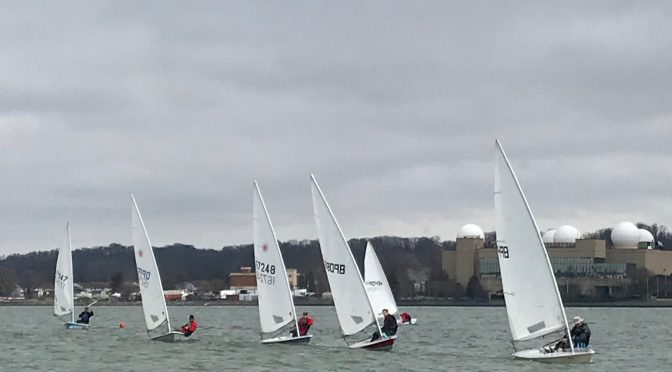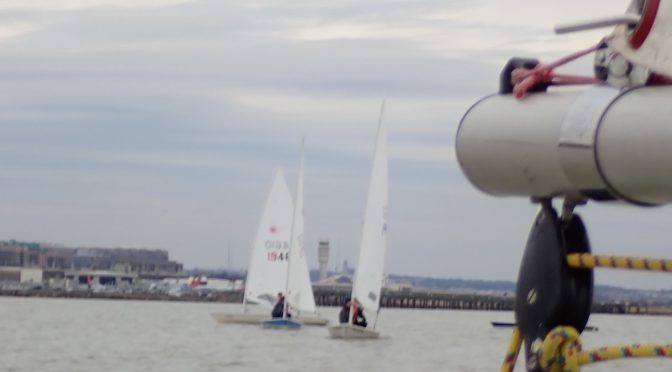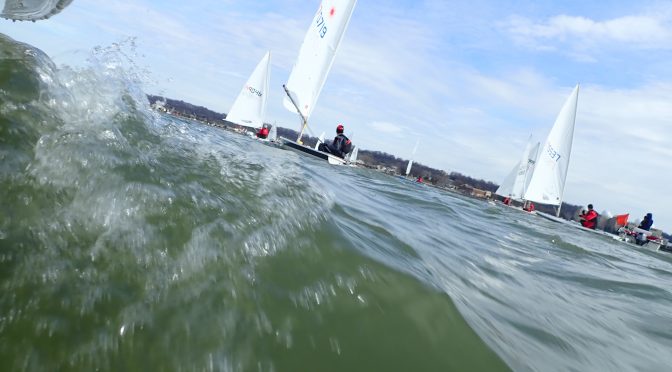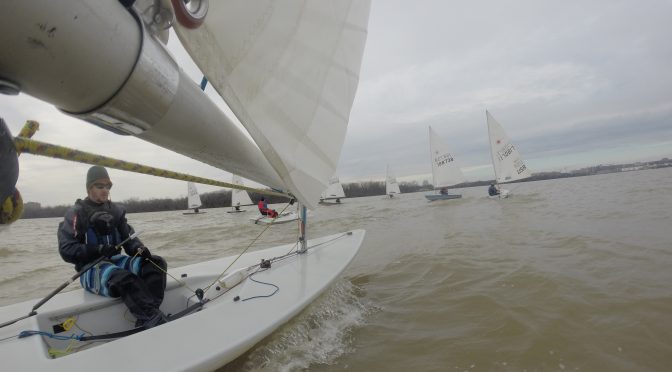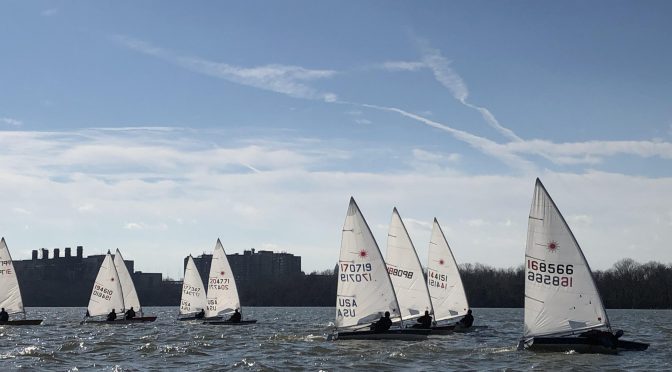Category Archives: Series
Spring, Fall, Wednesday night, and Frostbite Series
2018-2019 Laser Frostbite Series #16
It was a beautiful day on the river. Sunny and warm with intermittent good wind. Although I finished in roughly the same place I do most Sundays (that is, near the back with a rare strong race), today worked in my favor as there were only 5 or 6 boats, leaving me with my first 3rd place finish. The wind was flukey, very light at times followed by a strong steady breeze. The wind kept shifting at the beginning, making it nearly impossible to set a windward-leeward course. In fact, the first race turned into reaches both ways. After the first race, the wind held relatively steady – in direction if not speed, allowing us to get in lots of races. With a small fleet, it was much easier for those of us new to Laser racing to be aggressive at the start and at the marks – instead of being out strategized by lots of boats, there was only one or two to content with at each rounding. The shifty wind favored those with good tactics and a good sense of the river winds – boats well ahead often lost considerable ground to others on a different tact, seemingly at random but clearly not since the top two boats consistently finished 1-2. The winds also, at times, left the fleet bobbing in the water for a few minutes before picking up again (I’m guessing the windier parts of the day were above 10 knots if not more). As a new racer, I found the smaller fleet a great opportunity to work on sail trim, starts and mark roundings. Other than to note a number of us have been talking about finding times this spring and summer to sail, not much else to report other than to thank the race committee and to encourage people to come out for the last few weekends of the series.
2018-2019 Laser Frostbite Series #15
2018-2019 Laser Frostbite Series #14
2018-2019 Laser Frostbite Series #13
Today was looking a little iffy when we woke up this morning. With a pending gale warning starting at 3, we were not too sure what the weather was going to have in store for us. Nabeel and Kevin were on race committee and were optimistic to get some races in before the gale came. We decided that we would go out and race until the wind shifted to the west which would be when the big breeze would come in.
We ended up getting 5 races in without the wind ever getting too crazy. With the sun out and the temperature getting close to 60 as well as breeze in the upper teens and low twenties I doubt anyone was cold today. We did triangles for the first 4 races and finished with windward leeward for the last race. There was lots of capsizing, I do not think anyone made it through the day without at least one. The breeze was mostly out of the south but there were some small shifts that had to be looked for, The first 2 races had the most breeze and then everything kind of moderated out to something in the mid teens.
With a south breeze, a flooded river, and changing high to low tide, the long upwind leg didnt take too long due to the current. The triangle courses didn’t allow much to happen tactically outside of sailing fast, keeping the boat moving, and not capsizing (or if you did capsize have a quick recovery). But the downwinds were pretty fun with some nice waves to surf. But the waves were fairly choppy and I found it best to move your weight forward and backward in the boat. This was both to keep the boat on the wave as well as not dive your bow into the wave in front of you.
All in all, it turned out to be a very nice day on the water and the high winds never really seemed to show up. Just goes to show that the forecasts are not always right and its always worth coming down to the marina to at least see what is going on.
2018-2019 Laser Frostbite Series #12.5
2018-2019 Laser Frostbite Series #12
Hello Sailors,
2018-2019 Laser Frostbite Series #10
Today was a really nice day of racing. The wind was up with a constant 10 gusting to 20 out of the south and the temperatures were around 45 degrees. Sadly the sun did not come out which would have made it nicer. Thanks to John and Jolie for doing RC. They were able to get off 6 Olympic races and had a pretty square course. Each race was running about 18 minutes. Due to all the recent rain, we had a nice high river and the current was ripping out all day with it getting worse at the end of the day.
2018-2019 Laser Frostbite Series #7
Great day out on the water just what we all needed sun and wind, don’t know what those gusts were getting up to but they had the potential for trouble! Quite a bit of chop in the river today so somtimes it was hard setting up the rig, tight and point high into the chop verses, loose and go for speed, I went with the point high option. Down wind was all reaching so capsize potential, not so bad once the boat up on the plane. The windward mark seemed to still have a lot of water pushing on it or perhaps it was just a lot of leeway on the boat. Did not get the vang of in time on last race semi-capsized, not good.
2018-2019 Laser Frostbite Series #6
In a breach of tradition, I was asked to provide some thoughts on today’s racing.
I am not going to recount each race, but as we all know the breeze was light all day and the current was slack for the first race, but progressively got stronger heading down river (and upwind) making the beats short and the down wind legs seem much longer. The pin end was favored to varying degrees throughout the day.
The upwind leg was short so it was imperative to get off the line quickly today as there was little opportunity to recover from a bad start (as a learned after flipping at the start…).
What worked for me today was to get a clear air start at or near the pin, get the boat moving as fast as possible and then look for an opportunity to tack to port and towards the windward mark. Simple in concept, sometimes tougher in execution….
I think in the light conditions we had today it is critically important to constantly seek to find more power in the rig. This means a loose outhaul (one to one and one half hands at the middle of the boom), loose Cunningham (or maybe just a tiny bit but not enough to remove wrinkles), and Vang slightly less than block to block tension (You want the mast to straighten when you ease the sheet for power).
I don’t think I ever was able to “two block” my sheet tension today, but generally had my sheet eased out between 6-18 inches depending on wind pressure.
The key to light air speed is to ease the sheet for power to get the boat moving. As the sail powers up, you can then apply more weight on the rail, which translates force into your foils and increases boat speed. As the speed builds, you can trim the main for greater efficiency. The trick is not to let the boat stall after you trim in more closely. After you trim in and you start to feel the boat lose power you have to immediately ease the sheet again to get more power. Adjustments should be pretty subtle unless there is a big wind speed change. I believe this cycle of easing for power, applying weight to the rail to increase speed, and then trimming as the boat accelerates is key to being fast in light conditions.
Similarly, I think the most important factor downwind was working to keep the boat powered up. Whenever it got really light downwind I felt it was fast to either head up 15-20 degrees or sail aggressively by the Lee to increase flow across the sail. Once the boat was moving well, then it was time to head more towards the mark. I think I ended up gybing on every down wind leg because I sailed “hotter” angles and almost never dead down wind.
Hope a few folks find this helpful. Thanks to all for sailing today and Happy New Year!
Keith

